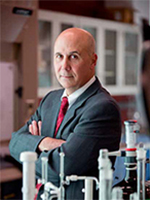Guy Vallaro, M.S. ’89, Ph.D., has always been drawn to the sciences. He worked in the beverage labs at PepsiCo before entering the Graduate School of Basic Medical Sciences. While enrolled at NYMC he gained experience at the Westchester County Medical Examiner office. Always following the next clue, he pursued a Ph.D. in pharmaceutical science and toxicology from St. John’s University. After several executive posts with the University of Massachusetts Memorial Medical Center Department of Hospital Laboratories he was recruited to direct Connecticut’s Forensic Science Laboratory. Vallaro continues to solve current and cold cases using history from ancient Greeks and Egyptians to modern day tricks of the trade.
Guy Vallaro, M.S. ’89, Ph.D., says he was drawn to toxicology well before the days of C.S.I.— short for Crime Scene Investigation, a popular television show in which investigators use physical evidence to solve grisly murders. Now the director of Connecticut’s Forensic Science Laboratory, Vallaro talks about his field of expertise: the study of poisons, whose history stretches back to the ancient Greeks and Egyptians. Summarizing a famous quote by the Renaissance physician Paracelsus, he intones: “All things are poison…it’s just a matter of the dose.”
“Beyond the mystery and intrigue, it’s very analytic,” he adds. “You use chemistry, biology, physiology—all the basic sciences I studied at New York Medical College.” Vallaro had worked in the beverage labs at PepsiCo before entering the Graduate School of Basic Medical Sciences. He worked for the Westchester County Medical Examiner while in the program, and afterwards received a Ph.D. in pharmaceutical sciences and toxicology from St. John’s University.
After moving to Massachusetts, Vallaro held several executive posts with the University of Massachusetts Memorial Medical Center Department of Hospital Laboratories, including vice president of clinical laboratories and vice chairman of hospital laboratories. After rising to director of the state’s forensic lab, he was recruited by the State of Connecticut to shore up its lab accreditation, which was withdrawn in 2011. “Dr. Vallaro is the perfect leader to restore our lab to what it once was: the envy of our nation,” Connecticut Governor Dannel Malloy told the press last year, confident the renowned forensic expert would build “the best crime lab in the country.”
When he took office in January 2013, Vallaro walked into a backlog of 6,000 DNA cases. “It’s a burden on many labs across the country, including mine,” he says. “As technology and sensitivity of DNA forensics increased, labs like ours have been receiving more evidence without a comparable increase in staffing. The investigators on C.S.I. solve every problem in an hour. Unfortunately, we don’t.” With the help of a bigger staff, Vallaro slashed the backlog to 3,000 in 10 months, cutting waste and tripling productivity. “Our goal is to reduce [the time frame on] DNA cases from two and a half years to less than 60 days.”
Although his executive role doesn’t grant him as much hands-on lab work as he’d like (“I live vicariously through my 115 employees”), Vallaro oversees a range of disciplines that continues to expand. “Solving computer crime—analyzing hard drives and USBs for images; video enhancement of surveillance footage; lifting fingerprints from a doorknob; testing for accelerants that start fires in arson cases—it’s so much more than peering through microscopes to find the blue fibers that match the suspect’s blue sweater,” he says. “The diversity is just incredible.” And his lab is one of the few in the country with the ability to extract mitochondrial DNA from the bones of even decomposed bodies. “Recently we tracked down a suspect that way, finally solving a cold case,” he says with pride.
Vallaro and his wife, a forensic scientist in Rhode Island, still live in Massachusetts with their four children. But he’s energized by the 90-minute commute. “We have the victim in mind as we work, so we work hard,” he says. “We feel a great sense of satisfaction when we provide information that not only leads to closure for victims but also holds potential for exoneration. We’re not biased, but we’re there to find the truth.”

 Solving Forensic Mysteries
Solving Forensic Mysteries